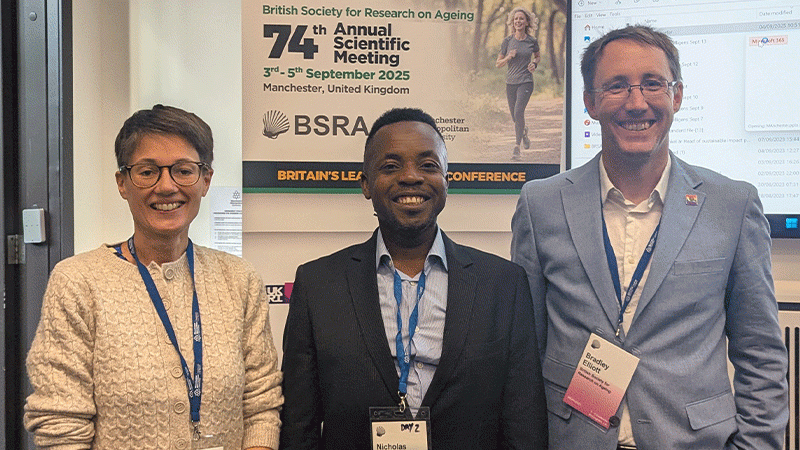The University of Westminster’s Ageing Biology and Age-Related Diseases Research Group has come in fourth in the latest rankings of ageing biology centres across the UK by the British Society for Research on Ageing (BSRA). The announcement was made at the Society’s 74th Annual Scientific Meeting where the updated league table was revealed and Westminster experts had the chance to present their ongoing research.

Held between 3-5 September at Manchester Metropolitan University, the Annual Scientific Meeting on the Biology of Ageing brought together leading experts and early-career researchers to share their latest findings in the mechanisms of ageing. Delegates attended oral communication sessions, keynote lectures, panel discussions, poster presentations and an Early Career Scientists workshop. The event provided valuable opportunities for networking, collaboration and celebrating scientific achievements in the field of research.
The BSRA concluded the conference by sharing their latest rankings, six months after the last update, where Westminster placed in tied fourth with University College London, moving up from sixth place.
Located within the Centre for Resilience in the School of Life Sciences, the group aims to understand how and why humans age and what they can do as individuals and a wider society to maximise their time spent in good health and minimise the biologically negative aspects of age. Along with the success in the league table, the research group has also seen an increase in the number of members, increasing by four.
The group is headed by Dr David Gaze, Senior Lecturer in Chemical Pathology and Course Leader of the Biomedical Science MSc course, who is currently researching in the area of cardiovascular biology, and Dr Bradley Elliott, Reader in Ageing Physiology and trustee of the BSRA. Other members include Dr Nicholas Baidoo, Dr Daniel Brayson, Dr Priya Gururajan, Dr Ilias Kazanis, Dr Yvoni Kyriakidou and Dr Lewis Mattin, as well as a number of doctoral researchers.
The BSRA was established in 1939 and represents scientists across the UK working on all aspects of the biology of ageing. It aims to encourage and support research that will ultimately help people slow biological ageing and thereby remain healthier and free of disease for longer.
Dr Elliott said: “It's great to see Westminster's growth as a centre for ageing research recognised by the BSRA. At the BSRA's annual scientific meeting this week, we are seeing the amazing work being conducted by Westminster Ageing Biology and Age-Related Diseases group members, including a poster presented by doctoral researcher Noemi Cherestes on ageing biomarkers, Dr Nicholas Baidoo's talk on structural changes in the ageing gut shortlisted for best oral presentation, a session chaired by myself on Interventions to Combat Human Ageing and a panel discussing Ageing Research in the Public Eye.”
Professor David Weinkove, Chair of the BSRA, said: “The number of BSRA members from the University of Westminster has increased substantially in the last six months. It shows their commitment to the field and the Society. I welcome new members and look forward to working together.”
The latest ranking highlights the University’s direct contribution to the United Nations Sustainable Development Goal (SDG) 3: Good Health and Wellbeing. Since 2019, the University of Westminster has used the SDGs holistically to frame strategic decisions to help students and colleagues fulfil their potential and contribute to a more sustainable, equitable and healthier society.
Find out more about previous and ongoing projects run by the Ageing Biology and Age-Related Diseases Research Group.





